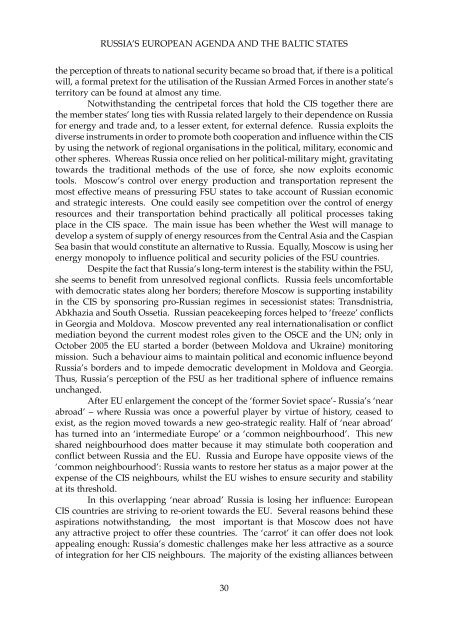Russia's European Agenda and The Baltic States - Defence ...
Russia's European Agenda and The Baltic States - Defence ...
Russia's European Agenda and The Baltic States - Defence ...
You also want an ePaper? Increase the reach of your titles
YUMPU automatically turns print PDFs into web optimized ePapers that Google loves.
RUSSIA’S EUROPEAN AGENDA AND THE BALTIC STATES<br />
the perception of threats to national security became so broad that, if there is a political<br />
will, a formal pretext for the utilisation of the Russian Armed Forces in another state’s<br />
territory can be found at almost any time.<br />
Notwithst<strong>and</strong>ing the centripetal forces that hold the CIS together there are<br />
the member states’ long ties with Russia related largely to their dependence on Russia<br />
for energy <strong>and</strong> trade <strong>and</strong>, to a lesser extent, for external defence. Russia exploits the<br />
diverse instruments in order to promote both cooperation <strong>and</strong> influence within the CIS<br />
by using the network of regional organisations in the political, military, economic <strong>and</strong><br />
other spheres. Whereas Russia once relied on her political-military might, gravitating<br />
towards the traditional methods of the use of force, she now exploits economic<br />
tools. Moscow’s control over energy production <strong>and</strong> transportation represent the<br />
most effective means of pressuring FSU states to take account of Russian economic<br />
<strong>and</strong> strategic interests. One could easily see competition over the control of energy<br />
resources <strong>and</strong> their transportation behind practically all political processes taking<br />
place in the CIS space. <strong>The</strong> main issue has been whether the West will manage to<br />
develop a system of supply of energy resources from the Central Asia <strong>and</strong> the Caspian<br />
Sea basin that would constitute an alternative to Russia. Equally, Moscow is using her<br />
energy monopoly to influence political <strong>and</strong> security policies of the FSU countries.<br />
Despite the fact that Russia’s long-term interest is the stability within the FSU,<br />
she seems to benefit from unresolved regional conflicts. Russia feels uncomfortable<br />
with democratic states along her borders; therefore Moscow is supporting instability<br />
in the CIS by sponsoring pro-Russian regimes in secessionist states: Transdnistria,<br />
Abkhazia <strong>and</strong> South Ossetia. Russian peacekeeping forces helped to ‘freeze’ conflicts<br />
in Georgia <strong>and</strong> Moldova. Moscow prevented any real internationalisation or conflict<br />
mediation beyond the current modest roles given to the OSCE <strong>and</strong> the UN; only in<br />
October 2005 the EU started a border (between Moldova <strong>and</strong> Ukraine) monitoring<br />
mission. Such a behaviour aims to maintain political <strong>and</strong> economic influence beyond<br />
Russia’s borders <strong>and</strong> to impede democratic development in Moldova <strong>and</strong> Georgia.<br />
Thus, Russia’s perception of the FSU as her traditional sphere of influence remains<br />
unchanged.<br />
After EU enlargement the concept of the ‘former Soviet space’- Russia’s ‘near<br />
abroad’ – where Russia was once a powerful player by virtue of history, ceased to<br />
exist, as the region moved towards a new geo-strategic reality. Half of ‘near abroad’<br />
has turned into an ‘intermediate Europe’ or a ‘common neighbourhood’. This new<br />
shared neighbourhood does matter because it may stimulate both cooperation <strong>and</strong><br />
conflict between Russia <strong>and</strong> the EU. Russia <strong>and</strong> Europe have opposite views of the<br />
‘common neighbourhood’: Russia wants to restore her status as a major power at the<br />
expense of the CIS neighbours, whilst the EU wishes to ensure security <strong>and</strong> stability<br />
at its threshold.<br />
In this overlapping ‘near abroad’ Russia is losing her influence: <strong>European</strong><br />
CIS countries are striving to re-orient towards the EU. Several reasons behind these<br />
aspirations notwithst<strong>and</strong>ing, the most important is that Moscow does not have<br />
any attractive project to offer these countries. <strong>The</strong> ‘carrot’ it can offer does not look<br />
appealing enough: Russia’s domestic challenges make her less attractive as a source<br />
of integration for her CIS neighbours. <strong>The</strong> majority of the existing alliances between<br />
30

















